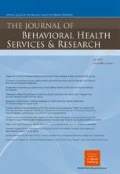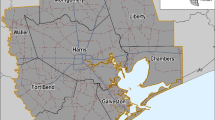Abstract
This article summarizes findings from two large-scale, population-based surveys conducted by Substance Abuse and Mental Health Services Administration (SAMHSA) and Centers for Disease Control and Prevention (CDC) in the Gulf Coast region following the 2010 Deepwater Horizon oil spill, to measure the prevalence of mental and substance use disorders, chronic health conditions, and utilization of behavioral health services. Although many area residents undoubtedly experienced increased levels of anxiety and stress following the spill, findings suggest only modest or minimal changes in behavioral health at the aggregate level before and after the spill. The studies do not address potential long-term effects of the spill on physical and behavioral health nor did they target subpopulations that might have been most affected by the spill. Resources mobilized to reduce the economic and behavioral health impacts of the spill on coastal residents—including compensation for lost income from BP and increases in available mental health services—may have resulted in a reduction in potential mental health problems.
Similar content being viewed by others
Notes
In Louisiana, counties are called “parishes.” In this paper, we use “counties” to refer to both counties and parishes.
Both the NSDUH GCO and the Gulf States Population Survey (GSPS) included Baldwin and mobile counties in Alabama; Escambia, Okaloosa, Santa Rosa, and Walton counties in Florida; Iberia, Jefferson, Lafourche, Orleans, Plaquemines, St. Bernard, St. Mary, St. Tammany, Terrebonne, and Vermilion parishes in Louisiana; and Hancock and Harrison counties in Mississippi. The GSPS also included Tangipahoa, Calcasieu, Jefferson Davis, Cameron, St. Charles, and Assumption parishes in Louisiana. The NSDUH GCO also included Clarke, Escambia, Monroe, and Washington counties in Alabama; Bay, Franklin, Gulf, and Wakulla counties in Florida; St. Martin and Lafayette parishes in Louisiana; and George, Pearl River, and Stone counties in Mississippi.
References
Substance Abuse and Mental Health Services Administration and Centers for Disease Control and Prevention. Behavioral health in the Gulf Coast region following the Deepwater Horizon oil spill. Available online at http://www.samhsa.gov/data/nsduh/nsduh-gsps-gulf-coast.pdf. Accessed March 29, 2013.
Kennedy MS. Another tragedy on the Gulf Coast. The American Journal of Nursing 2010;110(9):7.
Nelson R. Adding insult to injury: Five years after Katrina. The American Journal of Nursing 2010;110(9):19–21.
Voelker R. Memories of Katrina continue to hinder mental health recovery in New Orleans. Journal of the American Medical Association 2010;304(8):841–843.
Arata CM, Picou JS, Johnson GD, et al. Coping with technological disaster: An application of the conservation of resources model to the Exxon Valdez oil spill. Journal of Traumatic Stress 2000;13(1):23–39.
Ritchie LA, Gill DA, Picou JS. The BP disaster as an Exxon Valdez rerun. Contexts 2011;10(3):30–35.
Becker SM. Psychosocial assistance after environmental accidents: A policy perspective. Environmental Health Perspectives 1997;105(Suppl 6):1557.
Button GV. What you don’t know can’t hurt you: The right to know and the Shetland Island oil spill. Human Ecology 1995;23(2):241–257.
García-Mira R, Real JE, Uzzell DL, et al. Coping with a threat to quality of life: The case of the Prestige disaster. Revue Européenne de Psychologie Appliquée/European Review of Applied Psychology 2006;56(1):53–60.
Osofsky HJ, Palinkas LA, Galloway JM. Mental health effects of the gulf oil spill. Disaster Medicine and Public Health Preparedness 2010;4(4):273–276.
Solomon GM, Janssen S. Health effects of the Gulf oil spill. The Journal of the American Medical Association 2010;304(10):1118–1119.
Neria Y, Nandi A, Galea S. Post-traumatic stress disorder following disasters: A systematic review. Psychological Medicine 2008;38(4):467–480.
Safina C. The 2010 Gulf of Mexico oil well blowout: a little hindsight. PLoS Biology 2011;9(4):e1001049.
Slomski A. Experts focus on identifying, mitigating potential health effects of Gulf oil leak. The Journal of the American Medical Association 2010;304(6):621–624.
Miraglia RA. The cultural and behavioral impact of the Exxon Valdez oil spill on the native peoples of Prince William Sound, Alaska. Spill Science & Technology Bulletin 2002;7(1–2):75–87.
Lee MR, Blanchard TC. Health Impacts of Deepwater Horizon Oil Disaster on Coastal Louisiana Residents. Available online at http://www.lsu.edu/pa/mediacenter/tipsheets/spill/publichealthreport_2.pdf. Accessed June 13, 2011.
Abramson D, Redlener I, Stehling-Ariza T, et al. Impact on Children and Families of the Deepwater Horizon Oil Spill: Preliminary Findings of the Coastal Population Impact Study. National Center for Disaster Preparedness, Research Brief 2010: 8. August 3, 2010. Available online at http://www.ncdp.mailman.columbia.edu/files/NCDP_Oil_Impact_Report.pdf. Accessed June 13, 2011.
Gill DA, Picou JS, Ritchie LA. The 2010 BP oil spill and 1989 Exxon Valdez oil spill: A comparison of initial social impacts. American Behavioral Scientists 2012; 56 (1): 3–23.
Centers for Disease Control and Prevention (CDC). Behavioral Risk Factor Surveillance System Survey Data. Available online at http://www.cdc.gov/BRFSS/. Accessed
Pfizer. Patient Health Questionnaire screeners. Available online at http://www.phqscreeners.com/. Accessed August 29, 2013.
Centers for Disease Control and Prevention. Gulf States Population Survey. Available online at http://www.cdc.gov/osels/phsipo/dbs/gsps.html. Accessed March 29, 2013.
Council of State and Territorial Epidemiologists. Disaster Mental Health Surveillance at State Agencies: Results from a 2013 CSTE Needs Assessment. Available online at http://c.ymcdn.com/sites/www.cste.org/resource/resmgr/EnvironmentalHealth/DMHSFinalReport.pdf.
Conflict of Interest
The authors report no conflict of interest.
Author information
Authors and Affiliations
Corresponding author
Rights and permissions
About this article
Cite this article
Gould, D.W., Teich, J.L., Pemberton, M.R. et al. Behavioral Health in the Gulf Coast Region Following the Deepwater Horizon Oil Spill: Findings from Two Federal Surveys. J Behav Health Serv Res 42, 6–22 (2015). https://doi.org/10.1007/s11414-014-9441-8
Published:
Issue Date:
DOI: https://doi.org/10.1007/s11414-014-9441-8



